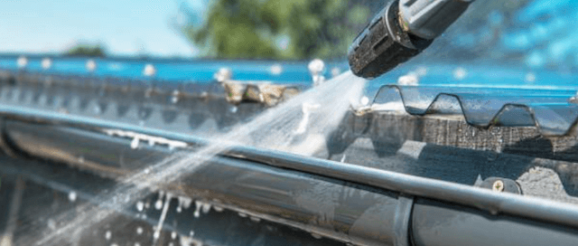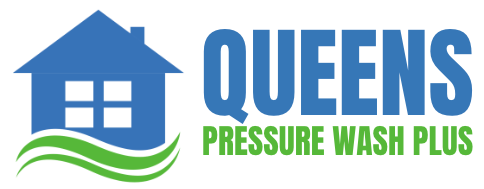Soft Washing vs. Pressure Washing

It’s shocking just how dirty the outside of your home can get over a year. Some of the most typical stains include dirt or mud splatter, algae, mold and mildew. These things can give your home an unkempt, uncared for look, even though you invest a lot of time and maintenance into it.
Some of these materials, like dirt, are harmless, but algae and mildew can be destructive to your health and your home. These contaminants create allergens that can impact your family, and some of them, like algae, can even grow underneath vinyl or roofing material and enter your home.
As a professional pressure washing service in Corona, we recommend you have your home’s exterior cleaned once every 12 months. The spring season is the most common time of the year to do an intense home cleaning, but you can do it any time throughout the year so long as the weather allows.
WHAT NEEDS PRESSURE WASHING?
All of the following home surfaces need to be cleaned from time to time:
• Vinyl siding
• Rock and stone
• Brick
• Concrete and asphalt
Power washing used to be the only method to thoroughly clean vinyl siding, brick and painted home surfaces. Now in 2021, homeowners have a second option for exterior home cleaning: soft washing.
As the names imply, one method is much gentler than the other, but there’s more to it than just that. Let’s look at the features of each to help you judge which is best for your home.
WHAT IS SOFT WASHING?
The soft wash method uses much less pressure than a typical pressure washer, hence the name. The highest water pressure in a soft washing system is 500 PSI. This lighter spray is produced from a nozzle with a wider spray option, only slightly more powerful than a typical backyard lawn hose.
Soft washing uses a mixture of soap, bleach and water in some combination to remove organic matter and debris from your home, roof and other outdoor surfaces. The cleaning solution used in a soft washing process can include algaecides and residual inhibitors to help stop further growth of these organisms in the future.
Because chemicals, not water pressure, are key to cleaning the surfaces, no powerful water is required. This means that soft washing should be used for more delicate surfaces that would otherwise be harmed by harsher pressure washing.
The soft wash solution is sometimes washed off, but not every time. This just depends on what type of solution is used, if there’s plant or animal life that could be affected by the solution runoff, and if the chemicals are strong enough to harm surfaces over time.
Soft washing offers the distinct advantage of reaching into small cracks and crevices to kill even unseen bacteria, meaning that its results can last longer than traditional pressure washing.
WHAT IS PRESSURE WASHING?
Pressure washing has always been the gold standard for cleaning home exterior surfaces. It is extremely effective and quick, which is why most home and business owners prefer it.
This particular cleaning method uses water only, there are no chemicals, to eliminate stains and organisms from home exterior surfaces. The use of plain water is a major plus to property owners who don’t want to use cleaning chemicals, either for the environment’s sake or to avoid zoning violations.
It can be used on several different materials. Home owners often choose pressure washing for cleaning their driveway, patio, decks, walkways and outdoor furniture because it is fast, more efficient and affordable.
Pressure washing needs somewhere from 1300 to 3100 PSI water pressure with water being sprayed out of a tiny nozzle for the most power. Both organic and inorganic materials are blasted from your home’s surface, preventing their growth and renewing the appearance of your home.
One negative about pressure washing is that the water can sometimes be too powerful and lead to damaging the surfaces of your home you want to clean. Pressure washing is strong enough to cut deep grooves into wood and plastic, and it can get into cracks, breaking off chunks of stone or brick.
IS PRESSURE WASHING OR SOFT WASHING BETTER?
The real question for homeowners is, “Which one should I choose?”
Both soft washing and pressure washing methods are good choices for your home’s exterior, as well as sidewalks, driveways and more. Both of these cleaning systems can be performed by a professional company – and truthfully, are more effectively done when left to the pros.
Soft washing is excellent for outdoor play sets, yard equipment, shingle roofs, decks, gutters, patios and painted surfaces because it is unlikely to harm plastic and wood. It’s also a safe and smart choice for vinyl siding.
It removes organisms currently present on the surface, and it prevents future growth for longer than pressure washing can.
A disadvantage of soft washing is that it can kill plants underneath the surface you’re cleaning. Remember to spray them with water right before putting the soft wash chemicals on your home or roof, and it shouldn’t be a problem.
Pressure washing is the preferred choice for difficult stains, and harder surfaces like asphalt, stone and brick. Pressure washing is the preferred method for commercial surfaces. A professional pressure washing service in Corona may use a mixture of chemicals and water pressure to clean offf problematic stains, but they should let you know if they will be spraying chemicals after your estimate.
It can be used on siding as well (and has been for several years) so long as it is done carefully. Powerful water pressure can break off weak or small pieces of the vinyl. A local service that does pressure washing often will know how to protect vulnerable areas, but a first-timer can do a lot of harm.
Your home’s roof is off limits for pressure washing if you have slate, tile or asphalt shingles. The extreme pressure of the water can damage these materials and cause you to replace your roof far earlier than expected.
Deciding between soft washing or pressure washing is best left for a professional pressure washing service. Which process is right for your home? Give Queens Pressure Wash Plus a call at 929-205-7375 and we’ll send a trained technician over to take a look!
